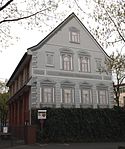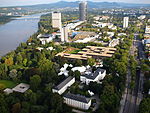German Commission for UNESCO
The German Commission for UNESCO is one of 195 National Commissions for UNESCO worldwide, a unique structure in the UN system, foreseen by UNESCO's constitution of 1946. The German Commission was founded on May 12, 1950, one year before West Germany was officially admitted to UNESCO. It has a liaison function for German Multilateral Foreign Cultural Policy; thus, its regular budget is financed by the Foreign Office. It is a chartered non-profit voluntary association with up to 114 members: Its members represent the German Federal government and the governments of the Laender, representatives of important German institutions working within UNESCO's fields of competence as well as individual experts. The German Commission for UNESCO advises the government, parliament and all other public bodies on UNESCO issues, as well as on other issues of multilateral policy in education, culture and science. It coordinates the contribution of German government, academia, expert institutions and civil society to UNESCO’s programme activities: Education, Natural and Social Sciences, Culture, Communication and Information. Notable activities are the international volunteer service "kulturweit", the German implementation of the UN decade on "Education for Sustainable Development", the German implementation of the UNESCO convention on cultural diversity and a cooperation framework with Africa. The Secretariat with about 45 staff members is located in Bonn and Berlin. Since 2002, the President is Walter Hirche and since 2004, the Secretary-General is Dr. Roland Bernecker. The Bureau and the executive committee of the German Commission for UNESCO are elected for two years, by a general assembly meeting once annually.
Excerpt from the Wikipedia article German Commission for UNESCO (License: CC BY-SA 3.0, Authors).German Commission for UNESCO
Colmantstraße, Bonn Weststadt (Stadtbezirk Bonn)
Geographical coordinates (GPS) Address Nearby Places Show on map
Geographical coordinates (GPS)
| Latitude | Longitude |
|---|---|
| N 50.731733333333 ° | E 7.0938138888889 ° |
Address
Colmantstraße 15
53115 Bonn, Weststadt (Stadtbezirk Bonn)
North Rhine-Westphalia, Germany
Open on Google Maps










